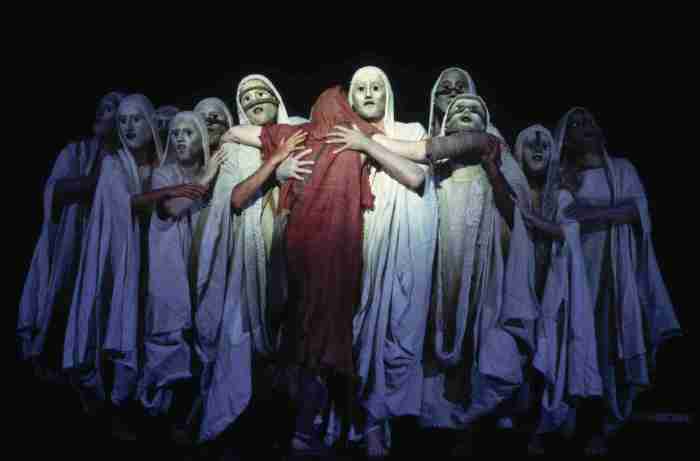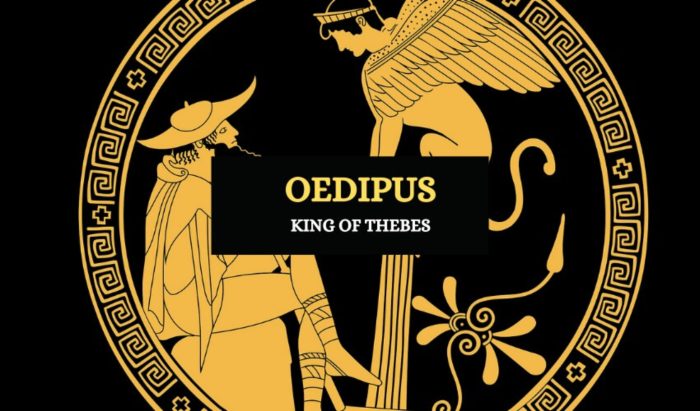Tragic king of thebes crossword – Embark on an enigmatic journey into the depths of Greek mythology and literature with our comprehensive crossword puzzle guide to the tragic king of Thebes, Oedipus Rex. This interactive exploration delves into the intricacies of Sophocles’ masterpiece, unraveling the complexities of fate, destiny, and the human condition.
Through the lens of a captivating crossword puzzle, we uncover the profound themes, characters, and cultural significance of this timeless tragedy. Join us as we decipher the cryptic clues and uncover the hidden depths of Oedipus’s ill-fated reign.
Oedipus Rex
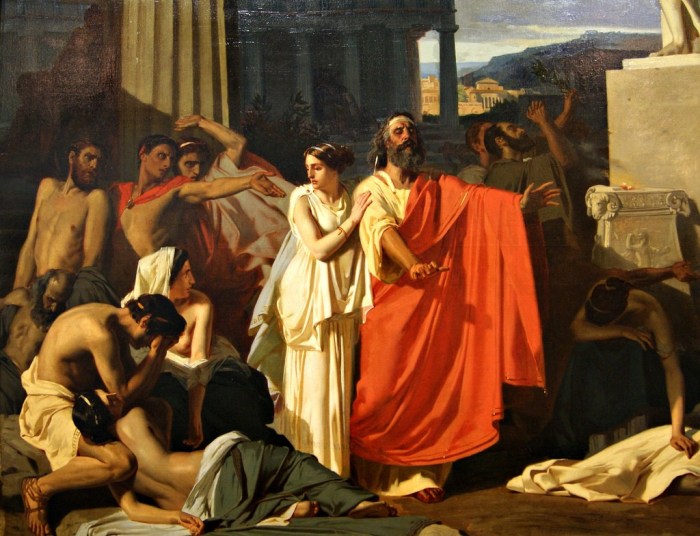
Oedipus Rex, written by Sophocles, is an ancient Greek tragedy that tells the story of Oedipus, a king who unknowingly kills his father and marries his mother.
The play begins with a plague ravaging Thebes. Oedipus, the city’s new king, consults the oracle at Delphi, which prophesied that the plague will end only when the murderer of the previous king, Laius, is found and punished.
Oedipus vows to find the killer and sets out on a quest to do so. He interrogates witnesses and follows clues, eventually leading him to the truth: he himself is the murderer.
Central Themes
Oedipus Rex explores several central themes, including:
- Fate and Free Will:The play raises questions about the extent to which our lives are predetermined by fate or whether we have free will to make our own choices.
- Knowledge and Ignorance:Oedipus’s quest for knowledge ultimately leads to his downfall. The play suggests that sometimes ignorance is bliss.
- Pride and Humility:Oedipus’s pride and arrogance lead to his downfall. The play suggests that we should be humble and accept our limitations.
Motifs
Oedipus Rex also uses several motifs, including:
- Sight and Blindness:Oedipus’s physical blindness mirrors his metaphorical blindness to the truth about himself.
- Light and Darkness:The play’s setting in Thebes, which means “light,” contrasts with the darkness of Oedipus’s crimes.
- Oedipus’s Tragic Flaw:Oedipus’s tragic flaw is his excessive pride, known as hubris. His pride leads him to believe that he is above the gods and can escape his fate.
The Theban Cycle
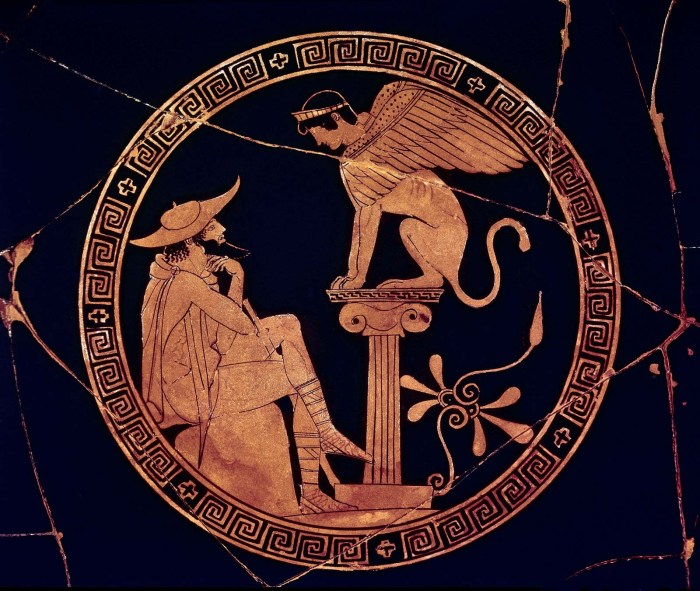
The Theban Cycle, a collection of Greek myths centered around the ill-fated city of Thebes, holds a significant place in Greek mythology. It encapsulates the tragic stories of the Labdacid family, cursed by the gods to endure generations of suffering and bloodshed.
The cycle revolves around key events and characters that weave a complex tapestry of fate, destiny, and human frailty. At its core is the story of Oedipus Rex, who unknowingly kills his father and marries his mother, fulfilling a prophecy that haunts him throughout his life.
Other prominent figures include Oedipus’s sons, Eteocles and Polyneices, whose rivalry leads to the tragic Battle of Seven against Thebes.
The Role of Fate and Destiny
The Theban Cycle is deeply imbued with the concept of fate and destiny. The gods, particularly Apollo and Zeus, play a pivotal role in shaping the events that unfold. Prophecies and oracles guide the characters’ actions, often leading them down paths of tragedy and despair.
The cycle explores the interplay between human free will and the inexorable forces that shape their lives.
The characters in the Theban Cycle are not mere puppets of fate. Their actions, choices, and flaws contribute to their downfall. Oedipus’s arrogance and rashness, for instance, lead him to unwittingly fulfill the prophecy that he would kill his father and marry his mother.
Yet, the gods’ influence remains undeniable, as they orchestrate events to ensure that the prophecy is realized.
The Theban Cycle serves as a cautionary tale about the consequences of hubris and the futility of resisting one’s destiny. It highlights the fragility of human existence and the enduring power of fate in shaping the course of events.
Sophocles’ Interpretation
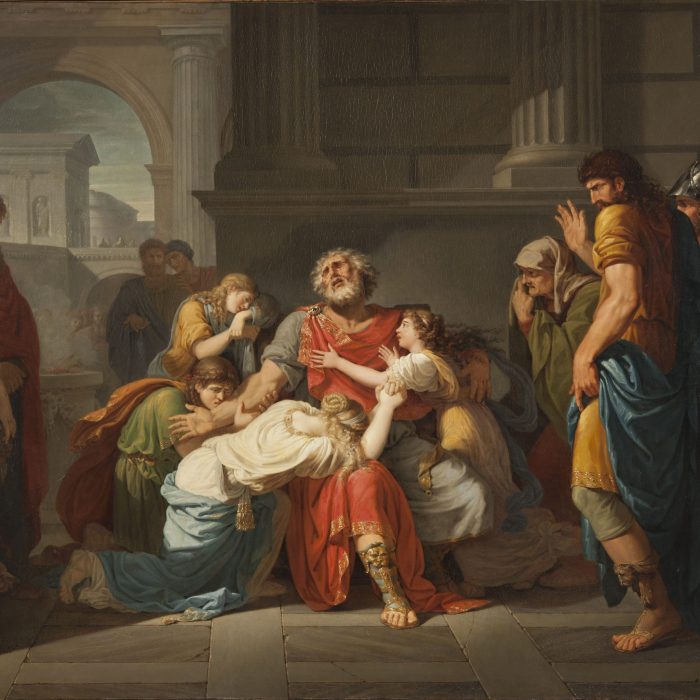
Sophocles’ interpretation of the Oedipus myth differs significantly from other versions in several key aspects. Sophocles emphasizes the role of fate and the gods in Oedipus’ downfall, while other versions place more emphasis on Oedipus’ own actions and choices. Sophocles also develops the character of Oedipus more fully, making him a more complex and tragic figure.
One of the most striking features of Sophocles’ interpretation is his use of dramatic irony and foreshadowing. Throughout the play, the audience is aware of Oedipus’ true identity, while Oedipus himself remains ignorant. This creates a sense of suspense and foreboding, as the audience knows that Oedipus is doomed to discover the truth about his past.
Impact on Greek Tragedy
Sophocles’ interpretation of the Oedipus myth had a profound impact on the development of Greek tragedy. His use of dramatic irony and foreshadowing became a standard feature of Greek tragedy, and his complex and tragic characters served as models for later playwrights.
Sophocles’ work also helped to establish the importance of the chorus in Greek tragedy, and his plays continue to be performed and studied today.
Cultural and Historical Context

Sophocles’ “Oedipus Rex” emerged from the vibrant cultural and historical milieu of ancient Greece, profoundly reflecting the values, beliefs, and preoccupations of its time.
Religious Beliefs
Ancient Greeks held an intricate belief system centered around a pantheon of gods and goddesses. These deities were believed to oversee human affairs, intervening in the lives of mortals and influencing their destinies. In “Oedipus Rex,” the Oracle of Delphi, a sacred figure believed to convey divine messages, plays a pivotal role in setting the tragedy in motion.
The play’s exploration of fate and divine retribution highlights the pervasive influence of religion in Greek society. Characters grapple with the inescapable power of the gods, acknowledging their vulnerability and the limits of human agency.
Social Hierarchy, Tragic king of thebes crossword
Ancient Greece was characterized by a rigid social hierarchy, with citizens ranked according to their wealth, lineage, and status. In “Oedipus Rex,” this hierarchy is reflected in the characters’ relationships and the power dynamics that govern their interactions.
Oedipus, as king, holds the highest position in society, yet his authority is ultimately challenged by the revelation of his true identity. The play explores the consequences of disrupting the established social order and the importance of maintaining harmony within the community.
Relevance to Contemporary Audiences
“Oedipus Rex” continues to resonate with contemporary audiences due to its timeless themes of fate, free will, and the consequences of one’s actions. The play’s exploration of human suffering, guilt, and the search for truth remains universally relevant.
Moreover, the play’s psychological insights into the human condition have had a profound influence on modern psychology and psychoanalysis. Sigmund Freud, the father of psychoanalysis, famously adapted the concept of the Oedipus complex from the play.
Essential Questionnaire: Tragic King Of Thebes Crossword
What is the central theme of Oedipus Rex?
The central theme of Oedipus Rex is the exploration of fate, destiny, and the limits of human knowledge.
Who is the tragic hero of Oedipus Rex?
Oedipus is the tragic hero of the play, a complex and flawed character whose downfall is brought about by his own actions and the inescapable forces of fate.
What is the significance of the Theban Cycle in Greek mythology?
The Theban Cycle is a collection of myths and legends surrounding the city of Thebes, including the story of Oedipus Rex. It explores themes of fate, destiny, and the consequences of human actions.
